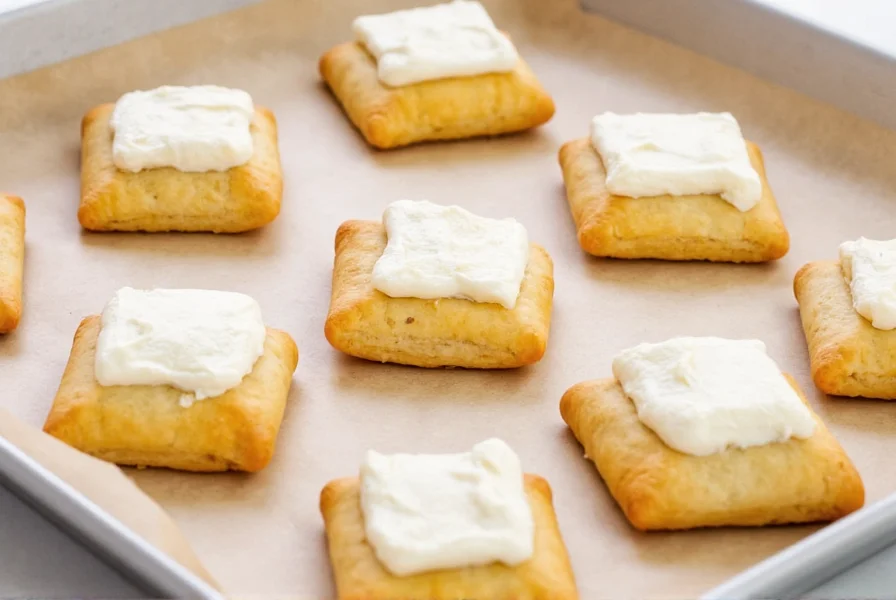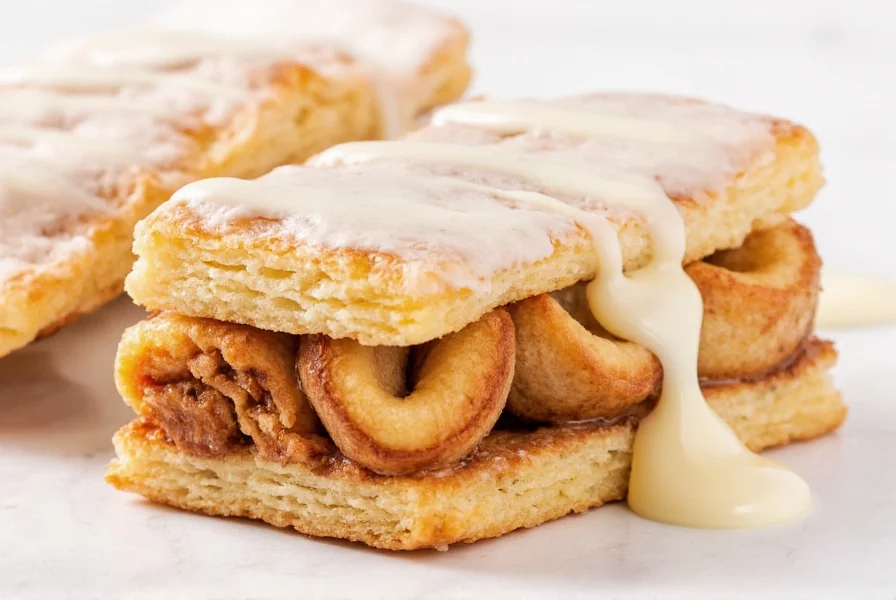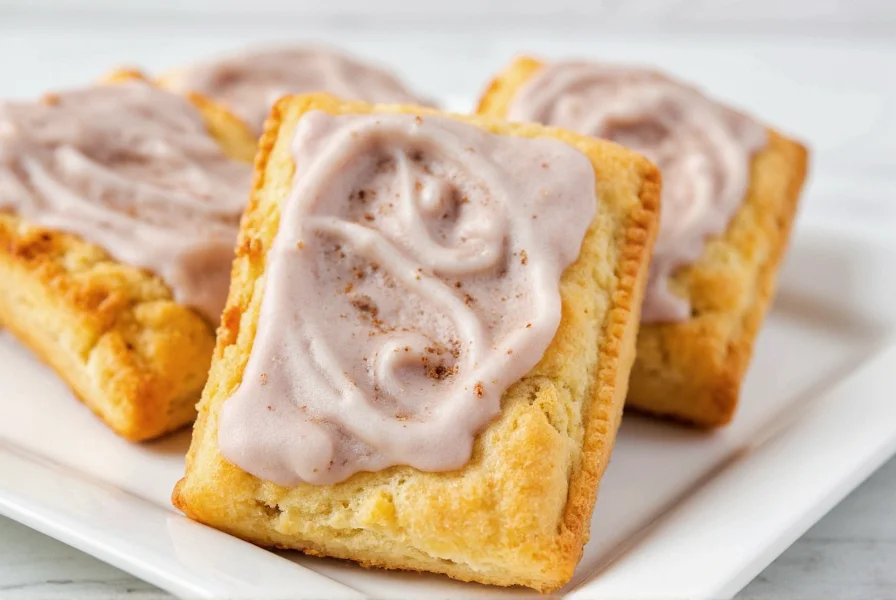Frosted cinnamon roll pop tarts represent one of the most popular dessert hybrids in modern baking culture. These handheld pastries merge two beloved breakfast classics into a single convenient treat that delivers the gooey cinnamon swirls of bakery-style rolls with the portable format of toaster pastries.
The Evolution of a Pastry Hybrid
While traditional pop tarts emerged in the 1960s as shelf-stable breakfast options, the cinnamon roll pop tart variation gained traction in the 2010s as home bakers sought to elevate convenience foods. Food bloggers and pastry chefs began experimenting with homemade versions that captured the essence of freshly baked cinnamon rolls in pop tart format, leading to today's popular frosted iterations.
Essential Components of Perfect Cinnamon Roll Pop Tarts
Creating authentic frosted cinnamon roll pop tarts requires attention to three critical elements:
| Component | Key Characteristics | Common Mistakes |
|---|---|---|
| Pastry Crust | Flaky, buttery, and sturdy enough to hold filling | Overworking dough causing toughness |
| Cinnamon Filling | Brown sugar base with proper cinnamon-to-sugar ratio | Using too much filling causing leaks |
| Cream Cheese Frosting | Smooth consistency that adheres without sliding | Applying while pastry is too warm |
Step-by-Step Preparation Guide
For homemade frosted cinnamon roll pop tarts from scratch, follow these professional techniques:
- Prepare the dough: Use a pastry cutter to incorporate cold butter into flour mixture until pea-sized crumbs form, then add ice water gradually
- Create the filling: Combine 1 cup brown sugar with 2 tablespoons cinnamon and 1/4 cup melted butter for optimal swirl formation
- Assemble carefully: Roll dough to 1/8-inch thickness, spread filling evenly but leave 1/2-inch border, then fold and seal edges with fork
- Bake properly: At 375°F for 20-22 minutes until golden brown, rotating pan halfway through baking
- Apply frosting correctly: Wait until pastries cool completely before drizzling with cream cheese icing

Avoiding Common Preparation Mistakes
Many first-time cinnamon roll pop tart makers encounter these issues:
- Filling leakage: Prevent by using appropriate filling quantity (about 1 tablespoon per pastry) and ensuring proper sealing
- Soggy bottoms: Bake on preheated baking sheet or use parchment paper for even heat distribution
- Flat pastries: Maintain cold ingredients and avoid overhandling the dough for optimal flakiness
- Frosting sliding off: Allow pastries to cool completely before icing application
Variation Options for Different Preferences
Customize your best cinnamon roll pop tarts recipe with these professional variations:
- Gluten-free version: Substitute with quality gluten-free flour blend and add xanthan gum
- Vegan adaptation: Use plant-based butter and cream cheese alternatives
- Reduced sugar option: Decrease filling sugar by 25% and use sugar substitute in frosting
- Gourmet enhancements: Add toasted pecans to filling or incorporate orange zest into dough

Storage and Serving Recommendations
For optimal enjoyment of your homemade frosted cinnamon roll pop tarts:
- Store in airtight container at room temperature for up to 3 days
- Freeze unbaked pastries for up to 3 months; bake from frozen with additional 5-7 minutes
- Reheat in toaster oven (not microwave) to maintain crisp texture
- Serve with complementary beverages like strong coffee or vanilla almond milk
Frequently Asked Questions
Can I make cinnamon roll pop tarts without a pastry cutter?
Yes, you can use two knives or your fingertips to cut cold butter into flour. Alternatively, freeze butter and grate it into the dry ingredients using a box grater for similar flaky results in your homemade cinnamon roll pop tarts recipe.
How do I prevent my cinnamon roll pop tarts from becoming soggy?
To maintain crisp texture in frosted cinnamon roll pop tarts, ensure proper baking temperature, avoid overfilling with cinnamon mixture, and allow complete cooling before applying frosting. Baking on a preheated baking sheet also helps create a barrier against moisture.
What's the ideal cinnamon-to-sugar ratio for authentic flavor?
The optimal ratio for homemade cinnamon roll pop tarts is 2 tablespoons of cinnamon to 1 cup of brown sugar. This balance delivers pronounced cinnamon flavor without overwhelming bitterness while maintaining the characteristic swirl appearance when baked.
Can I prepare cinnamon roll pop tarts ahead of time?
Yes, you can prepare cinnamon roll pop tarts in advance. Unbaked pastries freeze well for up to 3 months. Baked pastries keep at room temperature for 3 days or can be frozen for up to 2 months. Reheat in a toaster oven for best results when serving your make-ahead cinnamon roll pop tarts.
Why does my cream cheese frosting slide off the pop tarts?
Frosting slides off when applied to warm pastries. For perfect adhesion in your frosted cinnamon roll pop tarts, allow pastries to cool completely (at least 2 hours) before icing. If frosting remains too thin, increase powdered sugar ratio or refrigerate the icing briefly to thicken before application.











 浙公网安备
33010002000092号
浙公网安备
33010002000092号 浙B2-20120091-4
浙B2-20120091-4